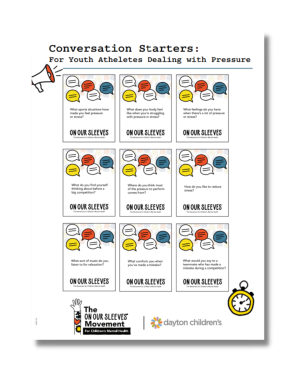8/1/23 blog post
5 ways to help a child handle pressure
helping children who compete handle pressure

Pressure isn’t always bad. Sometimes, a little stress can help us work just a little bit harder and do better than we expected.
But sometimes, it can feel overwhelming, like it’s dragging us to rock bottom.
And for kids competing in sports, if the focus is always on winning, that pressure can harm a child’s mental health.
Five Ways to Help a Child Deal with Pressure
1. Have a conversation. We can’t say it enough; you have to regularly talk to kids about how they are thinking and feeling. This will help you see how they handle pressure and are thinking about competition. Download our pressure conversation starters to get started.
2. Practice emotional awareness and regulation. Have you seen Olympic athletes with headphones on right before they get in the pool or take their mark on the track? Talk to your young athlete about what they can do to manage the pressure that they feel – from breathing exercises to listening to their favorite song. Our emotional empowerment materials can help all ages become more aware of their feelings.
3. Encourage other hobbies and interests. If you find a child in your life is focusing exclusively on one sport or competitive activity, help them find other clubs or groups that they can be involved in. Taking mental breaks away from their primary sport will help them build resilience. Encourage them to practice self-care activities, such as mindfulness to relieve stress.
4. Be careful how you say things. When a coach or parent yells out, “Don’t be a quitter!” it can send the message that if you don’t succeed, you aren’t trying hard enough or there’s something wrong with you. We don’t want young athletes to push so hard that they get injured or grow to dislike their sport. Instead, encourage with statements like, “Do your best,” or “We believe in you.”
5. Give praise for effort and learning skills, even after a loss. Make it a habit to congratulate the team whether they win or lose. Try to think of something that each team member improved on or tried hard at. This is especially important after a game or competition didn’t go well. Because children are always growing and learning, a game loss today can be a powerful motivator.
free download: pressure conversation starters
Now you’re ready to talk directly to that child in your life and find out their thoughts. Download our conversation starters to help (also available to download in Spanish). Coaches, parents and caregivers have a role to play in encouraging young athletes to take care of their physical and mental health. Because mental health - is health.


